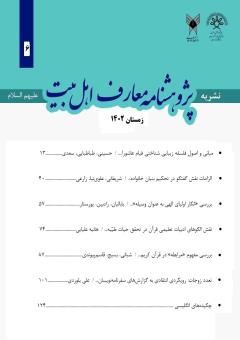تعدد زوجات: رویکردی انتقادی به گزارشهای سفرنامهنویسان دوره قاجار از منظر قرآن کریم و روایات
محورهای موضوعی : نشریه پژوهشنامه معارف اهل بیت علیه السلام
1 - دانش¬آموخته کارشناسی¬ارشد دانشگاه شهید بهشتی و دانشجوی دکتری مدرسی معارف اسلامی، گرایش اخلاق اسلامی، دانشگاه قرآن و حدیث تهران، ایران.
کلید واژه: تعدد زوجات, تاریخ ایران, دیدگاه اسلامی, آیات قرآن.,
چکیده مقاله :
دوره قاجار از برجستهترین دورههای تاریخ ایران و اوج حضور میسیونرها و سفرنامهنویسان در ایران است. در این برهه تاریخی سفرنامهنویسان اروپایی بهصورت سیاحت شخصی و بعضاً بهصورت هیئتهای اعزامی از سوی ابرقدرتهای اروپایی در ایران حضور پیدا میکردند. سفرنامهنویسان هر کدام باانگیزه و بینشی خاص، بنا بر روحیه و جنبه فرهنگی و اجتماعی خود و درحالیکه فرهنگ سرزمین خود را به همراه دارند به بررسی وضعیت اجتماعی، سیاسی و فرهنگی محل سفر خود میپردازند. در گزارشهای خود بر تضییع حقوق زنان بهواسطه تعدد زوجات اشاره کردهاند، برای نمونه گزارشاتی از چندزنی در میان جامعه مسلمان ایران در دوره قاجار گزارش کردهاند. این پژوهش در صدد پاسخگویی به این سؤال است که آیا این اتهام و سوءبرداشت سفرنامهنویسان از تضییع حقوق زنان درست است؟ این فرضیه دنبال میشود که سفرنامهنویسان، اولاً با اهداف و اغراض سوء این گزارشها را بیان کردهاند. ثانیاً با مرور تاریخ در ادوار گذشته در ایران و سایر جهان بالخصوص اروپا، روشن میشود که چندهمسری در قبل از اسلام هم در میان ملتهای زیادی رواج داشته است و این اسلام است که این پدیده را بهواسطه قوانینی مثل ایجاد عدالت در میان همسران ساماندهی کرده است تا از تضییع کرامت و حقوق زنان جلوگیری کند. هدف نویسنده در این پژوهش روشن کردن اغراض سفرنامه نویسان درتحریف فرهنگ ایرانی و اسلامی به واسطه مبانی اسلامی به ویژه آیات قرآن کریم است. روش نگارش این نوشتار؛ توصیفی، بر اساس گزارشهای سفرنامهنویسان دوران قاجار و سپس از روش تحلیلی، بر اساس مبانی اسلامی در پاسخ به سوءبرداشتهای است.
The Qajar period is one of the most prominent periods in the history of Iran and the peak of the presence of missionaries and travel writers in Iran. In this historical period, European travel writers visited Iran as personal tours and sometimes as delegations from European superpowers. Travel writers, each with a special motivation and insight, investigate the social, political and cultural situation of their travel destination, according to their spirit and cultural and social aspect, and while carrying the culture of their land with them. In their reports, they have pointed out the violation of women's rights due to polygamy, for example, they have reported reports of polygamy among the Muslim community of Iran during the Qajar period. This research aims to answer the question, is this accusation and misrepresentation of travel writers of violating women's rights true? This hypothesis is followed that the travel writers, first of all, have expressed these reports with malicious purposes. Secondly, by reviewing the history in the past periods in Iran and the rest of the world, especially Europe, it becomes clear that polygamy was prevalent among many nations before Islam, and it is Islam that organized this phenomenon through laws such as establishing justice among spouses. To prevent women's rights and dignity from being violated. The purpose of the author in this research is to clarify the purposes of travelogue writers in distorting Iranian and Islamic culture through Islamic foundations, especially the verses of the Holy Quran. The method of writing this article; Descriptive, based on the reports of Qajar period travel writers, and then analytical method, based on Islamic principles in response to misconceptions.

